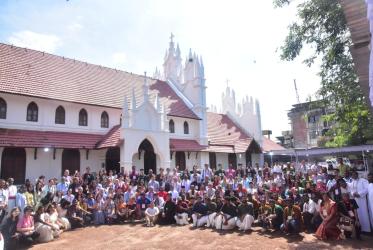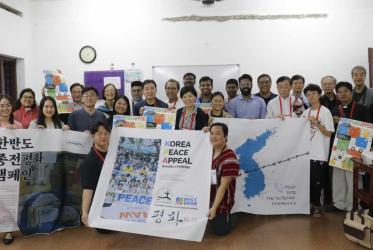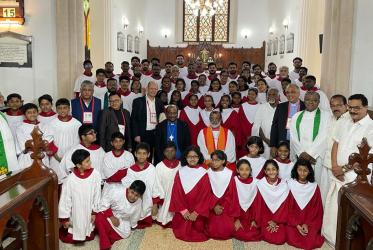by Rev. Dr Olav Fykse Tveit
WCC general secretary
Kuala Lumpur, 15 April 2010
Dear sisters and brothers in Christ!
It is with great pleasure and honour that I greet you on behalf of the World Council of Churches. I greet you on behalf of the global ecumenical movement of which the Asian churches are an integral part. Asian churches and Christians have a long tradition of contributing significantly to this movement.
The Christian Conference of Asia assemblies have been milestones in the common life of Asian churches. Since the first assembly here in Kuala Lumpur in 1959, significant impulses for unity in mission, service and witness have come from these meetings, to your churches, and from you to the fellowship of the World Council of Churches. You are here again these days to show that you are carrying the cross together in Asia, serving together with resilience and faithfulness, giving a common witness to contemporary challenges in Asia. Now you are setting a new milestone, to show where you are and to say where you are going.
This meeting of the churches of Asia is an historical event, here in the most populated of all continents, where so many important developments and changes of great significance for the whole world have taken place in our time. You are living in demanding times for many of you. Here you are the church, the salt of the earth. Here you are to give prophetic witness, to bring reconciliation and healing. In these days you are bringing your costly experiences and your prophetic dreams for tomorrow together. Here you are the ecumenical movement. Here you are responding to the call in Christ’s prayer “that they all may be one”.
I am indeed honoured and privileged to be invited to become a part of the 13th general assembly of the CCA. As in the first assembly, the general secretary of the WCC has the great privilege to represent the global fellowship you belong to and to which you are contributing so much. 51 years ago, Rev. Dr Visser t’ Hooft greeted the delegates and delivered the John R Mott Lecture at the first assembly of the Christian Conference of Asia (then called the East Asia Christian Conference – EACC).The invitation by the general secretary of the Christian Conference of Asia, Dr Prawate Khid-arn, to me was in fact the first invitation I received after my election as WCC general secretary. And I accepted it immediately. I have been looking forward to this personal encounter with so many people in the churches of this vast region of Asia, from Iran to New Zealand.
I have been inspired to hear the commitment to follow the common call represented in your theme during the days before the assembly. I have met with Asian youth. I have visited the pre-assembly for people affected by HIV in the churches of Asia, with the women’s pre-assembly, and with the people’s forum, and discussed with local church members and leaders here in Malaysia the challenges you have and the role of the World Council of Churches for Asian churches. These have been and will be significant days for me and my colleagues from Geneva who are sharing this experience with me.
Your rich culture, tradition and ecumenical heritage have inspired the churches and the ecumenical movement in many other parts of the world. The very formation of the CCA represents the continuation of contributions to the ecumenical movement and its ethos and traditions, building also on the established ecumenical councils in several countries. The CCA was founded on the “selfhood” and identity and the common evangelistic tasks of the churches in Asia, witnessing together. The conviction was that true partnership and unity in mission could happen only when a conference of churches was established in Asia. Thus it became an important contribution to the development towards a sense of mutual accountability in the ecumenical movement.
D.T. Niles once said: “We need progressively to find ways in which the confessional movements and the organs of the ecumenical movement do not just remain the parallel lines of a railway track, but like rivers moving towards a point of confluence. Temples are usually set up where waters meet. The place of confluence is the place of pilgrimage”.
Shall the place of confluence again be Kuala Lumpur, were the rivers meet?
May God bless the Christian Conference of Asia! May God bless you all! Thank you.




